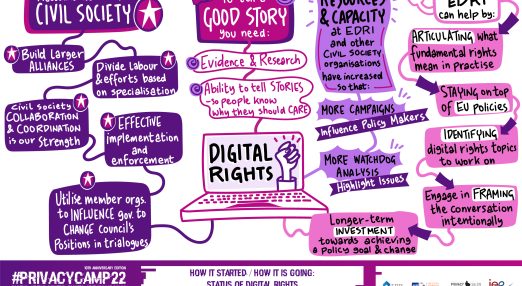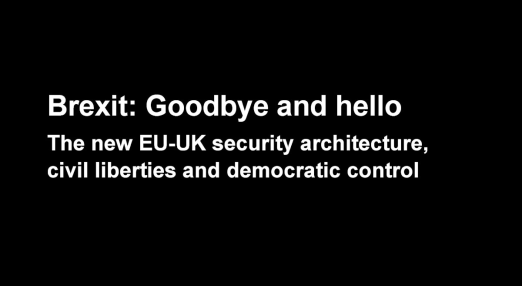Privacy and data protection
Privacy and data protection are essential for us to live, connect, work, create, organise and more. Governments and companies have long used mass surveillance for control trying to legitimise snooping for health, security or other reasons. The near-total digitisation of our lives has made it easier to control, profile and profit from our attention, data, bodies and behaviours in ways that are very difficult for us to understand and challenge. European data protection standards such as the GDPR are a good step forward but we need more to effectively ensure enforcement and protection against unlawful surveillance practices.
Filter resources
-

Technologies for border surveillance and control in Italy
This research points out that identification and categorisation systems for migrants, refugees, and asylum-seekers, rely on vast quantities of biometric data including fingerprints and facial images. It is, however, often difficult to assess how these procedures are managed. Upon identification, the aforementioned groups have limited knowledge and awareness about where and how their personal and biometric data are going to be stored and used, hindering them from countering the pressure that this flow of information puts on their subsequent living conditions in Italy and in the European Union.
Read more
-

Belgian authority finds IAB Europe’s consent pop-ups incompatible with the GDPR
Following a number of complaints filed in 2018 and 2019, including by EDRi-members Panoptykon and Bits of Freedom, and coordinated by the Irish Council for Civil Liberties, the Belgian Data Protection Authority has found that the consent system developed and managed by the adtech industry body IAB Europe, and used by many websites in the EU, is illegal under the GDPR.
Read more
-

How it started, how it’s going: Halfway through the current European Commission’s legislative term
In January 2022, EDRi held a panel at its annual flagship event Privacy Camp to discuss the EU’s current legislative term and what to expect by the next EU elections in terms of digital rights.
Read more
-

Chat control: 10 principles to defend children in the digital age
The automated scanning of everyone’s private communications, all of the time, constitutes a disproportionate interference with the very essence of the fundamental right to privacy. It can constitute a form of undemocratic mass surveillance, and can have severe and unjustified repercussions on many other fundamental rights and freedoms, too.
Read more
-

The EU Parliament takes strong stance against surveillance ads
The Platform Power campaign, alongside many civil society organisations, raised its voice for stronger laws against the business model of Big Tech online platforms and succesfully pressured law-makers to put people at the center of the debate.
Read more
-

EDRi-gram, 2 February 2022
In this edition of the EDRi-gram, we dive into the secret negotiations about Europol's reform that would enable mass surveillance of people and discriminatory predictive policing. We also take a peek at the European Parliament's approval of a rights-respecting Digital Services Act and its proposal to ban the use of sensitive personal data for online ads.
Read more
-

Join our bootcamp and Reclaim Your Face
Reclaim Your Face is expanding to different cities in Europe. To support this growth we are launching a bootcamp to train volunteers and expand the fight against biometric mass surveillance.
Read more
-

Framing the future of the internet
The European Parliament has just voted on the Digital Services Act, crucial for internet regulation.
Read more
-

Online Safety Bill: Kill Switch for Encryption
Of the many worrying provisions contained within the draft Online Safety Bill, perhaps the most consequential is contained within Chapter 4, at clauses 63-69. This section of the Bill hands OFCOM the power to issue “Use of Technology Notices” to search engines and social media companies.
Read more
-

Orwell’s Wallet: European electronic identity system leads us straight into surveillance capitalism
In June 2021 the European Commission launched a reform of the 2014 eIDAS Regulation to overhaul Europe’s framework for electronic identity (eID) systems. This ambitious reform tries to create a counterbalance to the widespread login systems of Google, Facebook and Apple, as well as to provide widely-adopted eID systems for eGovernment and eCommerce applications to the population.
Read more
-

UK can join EU surveillance schemes with no parliamentary scrutiny, warns new report
The UK can join intrusive EU surveillance schemes including a pan-European network of police facial recognition databases with no need for parliamentary debate or scrutiny, says a new report published by EDRi member Statewatch.
Read more
-

A beginner’s guide to EU rules on scanning private communications: Part 2
Vital EU rules on human rights and on due process protect all of us from unfair, arbitrary or discriminatory interference with our privacy by states and companies. As we await the European Commission’s proposal for a law which we fear may make it mandatory for online chat and email services to scan every person’s private messages all the time, which may constitute mass surveillance, this blog explores what rights-respecting investigations into child sexual abuse material (CSAM) should look like instead.
Read more
